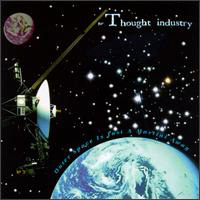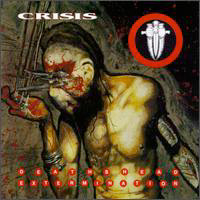 Thought Industry
Thought Industry
Outer Space Is Only A Martini Away (Metal Blade)
by Lex Marburger
Okay, it’s not metal. It’s not Goof Rock. It’s not New Wave. It’s not Art Rock. But it is. It’s all of these things, and none. I’m talking about Thought Industry and their new album, Outer Space is Only a Martini Away (Metal Blade). Consider the songs a novel way to listen to music. With song titles like “Love is America Spelled Backwards,” “D.I.Y. Tranquilizers,” and “Pinto Award in Literature,” it’s clear they are not taking themselves too seriously. However, they are able to prove that Thought Industry are quite able to play their instruments with acumen and skill. Clever drums, a seven string guitar, a fretless guitar, keyboards, bass, freak out vocals, excellent production, all with the intention to play good music.
And the places they go! The music stretches like a child’s toy, always focusing around a slight (slight!) metal hinge. From there, they travel everywhere. Emotional pseudo-grunge into a mixture of rocking, rollicking guitars and cheesy ’70s piano (“Soot on the Radio”), King Crimson-ish atmospheres married to New Wave (“The Squid”), Gang of Four meets Captain Beefheart at a soccer match and gets attacked by hoodlums from another dimension (“Jeb and the Haymaker”), grunge with instantaneous time changes and soft strings in the background (“Dante Dangling From a Noose”), anthemic choruses with something that could almost be Goth (“Watercolor Grey”), Rush deciding they don’t like art rock anymore and ending up writing an industrial tune (“Fairy”), and stuff I can’t even classify through contradiction.
What makes …Martini… so interesting is that usually the “band of many hats” routine is tired and tedious, but Thought Industry keeps you listening. Their creative approach to music makes sense after a while, and it comforts me when I think that my own ideas of music are too far out. Whether or not Thought Industry will make it on the radio doesn’t even matter. Martini… is one of those albums that will spread by word of mouth, like mono or the flu. The only thing that taints this album is that it doesn’t come with lyric sheets, and the vocals are usually touched with effects, making it difficult to understand what he is saying. All I know is that Thought Industry likes alcohol because they mention either a specific drink (gin, martini, etc.) or drinking in general on almost every song. But even with problems understanding the lyrics, I found myself liking this album, following the changes and variations in style, tempo, and volume attentively. What the hell? Thought Industry has provided us with an aural martini; let us visit the stars.



